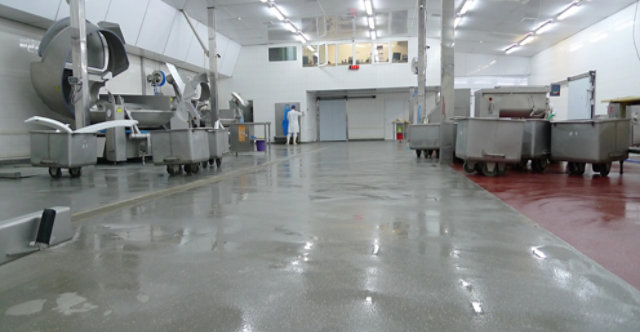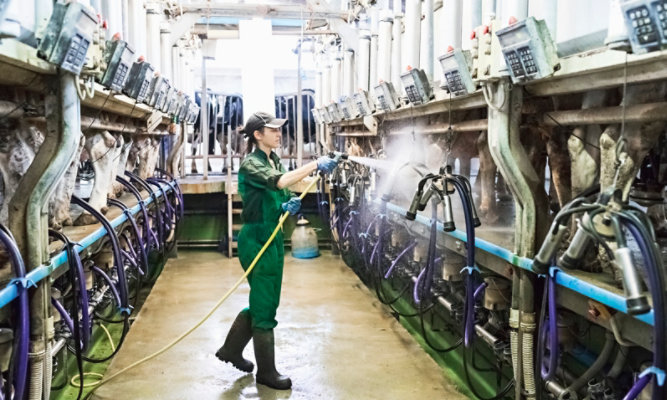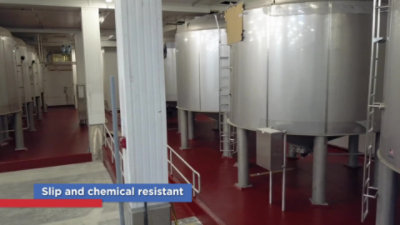
Thermal Shock Resistant Flooring and Coatings
Worry-Free Durability
All flooring material expands and contracts with changes in temperatures. Only when it occurs at a rate significantly different than that of the concrete substrate underneath, though, does it lead to disbondment, delamination, cracks, bubbles and other deterioration. With Sherwin-Williams thermal shock resistant flooring and coatings, however, your worries are over. These ultra-high performance floor systems expand and contract at a rate very similar to that of the concrete slab below, helping to ensure that your seamless, hygienic industrial concrete floors function exactly as they should.
Learn More or Get a Free Flooring Evaluation
What Is Thermal Cycling?
Thermal cycling is the process of a material repeatedly experiencing two temperature extremes—moving from hot to cold or cold to hot, often in rapid succession. These extreme swings can be part of regular operations in facilities that deal with food production, pharmaceuticals or any process involving high heat and subsequent cleaning with cold water and vice versa.
What Is Thermal Shock Resistance?
Thermal shock resistance is a material’s ability to withstand those rapid and extreme temperature changes without cracking, delaminating or otherwise failing.
During heating, materials expand. During cooling, they contract. When this expansion and contraction happen repeatedly and quickly, it stresses the material. If the material can’t absorb or adapt to that stress, it may fracture or break down.
In a flooring system, this type of failure can compromise hygiene, reduce longevity and increase maintenance costs. That’s why thermal shock resistant flooring is an important consideration.
How Does Thermal Shock Resistance Apply to Resinous Flooring?
Many industrial and commercial facilities rely on resin flooring systems, including epoxy and urethane coatings, for their durability, seamless finish and cleanability. However, not all resinous systems are created equal.
For example, epoxy is a popular choice due to its hardness and chemical resistance, but it does not perform as well as other materials when exposed to thermal shock. Picture a commercial kitchen floor exposed to 375°F oil spills or a meat processing facility that is washed down with 185°F water after operating in near-freezing conditions. The sudden 150°F temperature swing can quickly degrade an epoxy floor.
In contrast, cementitious urethane systems, like those offered by Sherwin-Williams, are engineered to endure these rapid changes without cracking or delaminating. They expand and contract in harmony with the concrete substrate, offering superior performance in high-stress environments.
Key Industries and Applications for Thermal Shock Resistant Flooring
Thermal shock resistant flooring is vital in a wide range of industries where temperature fluctuations are part of daily operations. These industries rely on processes involving heat generation, cold storage or routine high-temperature cleaning, all of which can create severe stress on traditional flooring materials.
Across these industries, thermal shock resistant flooring is a necessity for maintaining operational efficiency, reducing maintenance costs and ensuring safety. Investing in the right flooring solution protects your facility from avoidable disruptions and long-term damage.
Restaurant and Commercial Kitchens
Floors near fryers, ovens and dishwashers endure constant exposure to heat, grease and frequent high-temperature washdowns. These rapid shifts from cold to hot can crack or warp flooring materials that aren’t designed for thermal shock.
Cementitious urethane flooring offers the resilience and durability needed for such demanding restaurant and commercial kitchen environments.
Food and Beverage Manufacturing Facilities
Facilities in the food and beverage manufacturing sector routinely use high temperatures for cooking, processing and sterilization. At the same time, they also rely on cold storage or chilling equipment, making rapid temperature swings commonplace. Thermal shock resistant flooring ensures that production remains uninterrupted and hygienic even under intense conditions.
Meat and Poultry Processing Plants
Meat and poultry processing plants operate at low temperatures to preserve product freshness but frequently use hot water or steam during sanitation cycles. This contrast in temperature can easily damage standard flooring systems. A thermal shock resistant resinous floor helps maintain structural integrity and safety.
Bakeries
Ovens and other baking equipment create high-temperature zones that stress the surrounding flooring. When combined with routine cleaning or cooling practices, this heat exposure creates a perfect storm for thermal cycling. A flooring solution with strong thermal shock resistance can prevent costly damage and maintain cleanliness.
Pharmaceutical and Biotech Labs
Labs must meet stringent hygiene standards, which often involve using high-temperature sanitation methods. Sensitive equipment and environments demand reliable flooring that won’t degrade under sudden temperature shifts. Cementitious urethane floors support regulatory compliance and long-term performance.
Cold Storage and Freezer Areas
Flooring in cold storage and freezer areas regularly experiences below-freezing conditions. When exposed to warmer temperatures or cleaning procedures, floors without proper resistance can crack or become unsafe. A thermal shock resistant system ensures longevity and minimizes downtime due to flooring failure.
Benefits of Thermal Shock Resistant Resin Floors
Choosing a resinous flooring system enhances overall performance, safety and cost-effectiveness in demanding environments. A high-quality solution like cementitious urethane can dramatically improve the lifespan and functionality of your facility’s floors.
Durability in Harsh Environments
Cementitious urethane systems are designed to handle both the mechanical and thermal stress found in industrial and commercial spaces. Whether you’re dealing with hot equipment, cold storage or frequent sanitation cycles, these floors remain structurally sound. This extra durability means fewer repairs, less downtime and better return on investment.
Crack and Damage Resistance
The ability to expand and contract with temperature changes makes thermal shock resistant floors far less likely to crack or delaminate. Traditional floors may show wear quickly under thermal shock, but resinous systems hold up over time. This added resistance helps maintain a safe and smooth surface that meets both operational and regulatory requirements.
Lower Maintenance Requirements
Seamless, non-porous surfaces are easy to clean and do not harbor bacteria, dirt or moisture. A seamless, thermal shock resistant resinous flooring is therefore ideal for hygiene-sensitive areas like food production and healthcare. Plus, with fewer cracks or joints, there’s less risk of damage from cleaning chemicals or procedures.
Increased Safety and Hygiene
Because the surface of thermal shock resistant flooring resists cracking, it prevents the buildup of harmful pathogens and debris, which contributes to a cleaner, safer workspace for employees and reduces the risk of contamination. It’s an essential factor for industries with strict cleanliness standards.
Enhanced Longevity
Flooring systems that resist thermal shock will last longer even in punishing environments. Unlike materials that require constant repair or replacement, cementitious urethane systems and other resin floor coating solutions offer reliable performance for years. This longevity minimizes disruptions and maximizes operational uptime.
When to Consider a Thermal Shock Resistant Floor Coating
In facilities where floors are steam cleaned or otherwise exposed to rapid, extreme temperature cycling, not just any industrial concrete floor will do. Standard floor covering materials typically cannot withstand exposure to excessive swings in temperature without exhibiting signs of severe damage. Thermal shock resistant flooring and coatings provide the solution, giving you an economical and long-lasting way to protect your floors from thermal shock.
With thermal shock resistant flooring, harsh environments are significantly less susceptible to the damage caused by dramatic changes in temperature.
But thermal shock resistant flooring isn’t just for extreme environments—it’s for any facility where fluctuating temperatures could jeopardize the integrity of your flooring system. Knowing when to make the investment can save your business from costly failures and compliance issues down the line.
If your floor is likely to experience wide temperature fluctuations as part of daily operations, or if you fall into any of the following categories, this type of flooring is a necessity.
Your Facility Uses Hot Water or Steam for Sanitation
Sanitation procedures often involve high-temperature water, which can quickly impact flooring that has cooled during operations. The rapid temperature change can cause unprotected floors to crack or peel. A thermal shock resistant system withstands these cycles without compromising performance.
Your Operations Involve High-Temperature Cooking or Processing
Areas under ovens, fryers or industrial processing equipment are regularly exposed to high heat. Without thermal shock resistance, these areas are highly susceptible to damage over time. Flooring systems designed for heat exposure prevent degradation and maintain structural integrity.
You Have Refrigeration, Freezers or Rapid Cooling Environments
Moving from freezing conditions to ambient or heated environments can create dramatic thermal shifts. These swings can quickly cause failure in traditional flooring systems. A shock-resistant floor absorbs these changes without cracking or weakening.
You’ve Experienced Previous Flooring Failures Due to Cracking or Delamination
If your facility has a history of flooring issues in high-temperature or cleaning zones, it’s likely due to inadequate thermal shock resistance. Upgrading to a cementitious urethane system can provide a long-term solution. It eliminates recurring problems and improves facility safety and hygiene.
Thermal Shock Resistant Flooring FAQs
What Is Thermal Shock?
Thermal shock is the physical stress that occurs when a material undergoes a sudden and extreme change in temperature. These changes cause rapid expansion or contraction, which can result in cracking, warping or material failure if the product isn’t designed to handle it.
What Does “Thermal Shock Resistant” Mean?
“Thermal shock resistant” refers to a material’s ability to endure rapid temperature changes without experiencing damage such as cracking, warping or loss of adhesion. In flooring systems, this resistance ensures long-term performance in environments where extreme heat or cold is applied suddenly.
What Is Thermal Shock Resistant Flooring?
Thermal shock resistant flooring is designed to withstand sudden, extreme changes in temperature without cracking, delaminating or degrading. It’s commonly used in environments where surfaces are exposed to both hot and cold temperatures in rapid succession, like food processing plants, commercial kitchens and cold storage facilities.
What Is the Thermal Resistance of Flooring?
Thermal resistance in flooring measures how well a floor material can handle changes in temperature without undergoing physical or chemical damage. While exact resistance depends on the specific flooring system, high-performance cementitious urethane flooring is known for superior resistance to thermal shock and can typically handle temperature fluctuations of over 200°F.
What Is an Example of Thermal Shock Resistance?
An example of thermal shock resistance is a commercial kitchen floor that experiences a spill of 375°F cooking oil, followed by a cleaning washdown with 185°F water while the room is still cold from refrigeration. A thermal shock resistant floor will maintain its integrity during these sudden and repeated temperature swings, while traditional floors might crack or delaminate.
What Material Is Resistant to Thermal Shock?
Cementitious urethane is one of the most thermal shock resistant materials used in flooring. It’s engineered to expand and contract at a similar rate as the concrete substrate, which makes it ideal for environments with rapid or extreme temperature fluctuations. It outperforms epoxy and many other resinous materials in these conditions.
Is Epoxy Flooring Heat Resistant?
Epoxy flooring can tolerate moderate heat but is not considered thermal shock resistant. When exposed to sudden high temperatures or thermal cycling (such as from hot water washdowns or oil spills), epoxy may crack, discolor or delaminate. For environments with significant temperature extremes, cementitious urethane is a better choice.
What Degree Range Can Thermal Shock Happen?
Thermal shock can occur with temperature differences as small as 50°F, but it more commonly becomes problematic when the differential exceeds 100–150°F. For instance, a cold floor at 35°F that is suddenly hit with 185°F water experiences a 150°F shock, which is enough to damage standard flooring materials.
What Industries Need Thermal Shock Resistant Flooring?
Industries that benefit from thermal shock resistant flooring include food and beverage processing, commercial kitchens, meat and poultry processing, bakeries, pharmaceutical manufacturing, biotech labs and cold storage facilities. Any setting with rapid temperature changes or extreme hot/cold conditions is a candidate.
Can Thermal Shock Resistant Flooring Be Installed Over Existing Floors?
In many cases, yes. Thermal shock resistant flooring systems—especially cementitious urethane—can be installed over properly prepared concrete and sometimes over existing resinous flooring. However, an evaluation of the current surface is necessary to ensure proper bonding and performance.
How Long Does Thermal Shock Resistant Flooring Last?
When installed correctly and maintained properly, thermal shock resistant flooring can last 10–20 years or more. Its resistance to temperature-related stress and mechanical wear makes it a long-term investment for high-demand environments.
How Do I Maintain Thermal Shock Resistant Flooring?
Maintenance of thermal shock resistant flooring typically involves routine cleaning with non-abrasive detergents and warm water. These floors are designed to handle aggressive cleaning methods, including hot water washdowns and steam cleaning, without compromising their integrity.
Sherwin-Williams Thermal Shock Resistant Flooring and Coating Options
You may have seen other flooring materials crack, crumble, bubble or melt before your eyes when exposed to thermal cycling or extreme temperatures, but not our seamless, thermal shock resistant flooring. These hard-working flooring systems, with their slip-resistant, antimicrobial and chemical-resistant properties, give you the same sanitary and easy-to-maintain finish day after day, regardless of your high-pressure steam cleaning, boiling liquid spills and other environmental factors.
Even the punishing, higher temperature environment beneath industrial and commercial ovens is no match for our thermal shock resistant flooring. The tenacious bond goes on and on regardless of atmospheric changes—it’s hard to find a better industrial or commercial flooring value than the one you get with Sherwin-Williams. Where other flooring fails, these exceptional floor coating systems adapt and endure.
Let our local Sherwin-Williams experts help you decide on the best thermal shock resistant flooring for your facility and your budget. We offer a range of resinous flooring systems, including high-performance cementitious urethane coatings, engineered specifically for environments that demand thermal shock resistance. These solutions are designed to do the following:
- Bond tightly with concrete substrates
- Expand and contract in sync with the underlying material
- Provide long-term durability even in the most extreme thermal environments
Whether you’re building a new facility or retrofitting an existing one, Sherwin-Williams can help you specify the ideal system. Our experts will assess your space, your needs and your exposure conditions to ensure you get a floor that stands the test of time—and temperature.
Protect Your Floors from Extreme Temperatures with Sherwin Williams Thermal Shock Resistant Flooring Solutions
If your facility is exposed to sudden or extreme temperature changes, thermal shock resistant flooring is a smart investment.
Sherwin-Williams resin flooring solutions are specially formulated to meet the rigorous demands of industrial, commercial and institutional facilities. We offer a wide range of epoxy, polyurethane and cementitious urethane products and can create a solution that holds up to the unique challenges and temperature extremes of your project.
Contact a Sherwin-Williams representative today to learn more about installing a resin flooring system tailored to your environment and performance needs.
Discover More
Industry Expertise and Innovation
See how we help customers find customized solutions for their project and application challenges.
System Lookup
Find out more about our innovative floor systems for a variety of industries.
FIND A SYSTEM

